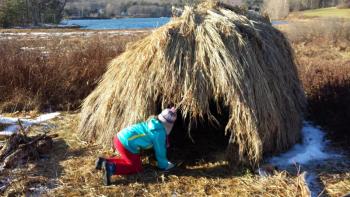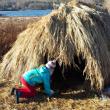Great Salt Bay third graders immersed in Wabanaki culture
 Great Salt Bay third grade students were among the more than 540 students that visited the Damariscotta River Association for a day of learning about Wabanaki culture in 2014. The children etched birch bark with Passamaquoddy artist and educator David Moses Bridges, built emergency shelters, tasted wild edibles, played snow snakes and heard native stories. Courtesy of Damariscotta River Association
Great Salt Bay third grade students were among the more than 540 students that visited the Damariscotta River Association for a day of learning about Wabanaki culture in 2014. The children etched birch bark with Passamaquoddy artist and educator David Moses Bridges, built emergency shelters, tasted wild edibles, played snow snakes and heard native stories. Courtesy of Damariscotta River Association
 Great Salt Bay third grade students were among the more than 540 students that visited the Damariscotta River Association for a day of learning about Wabanaki culture in 2014. The children etched birch bark with Passamaquoddy artist and educator David Moses Bridges, built emergency shelters, tasted wild edibles, played snow snakes and heard native stories. Courtesy of Damariscotta River Association
Great Salt Bay third grade students were among the more than 540 students that visited the Damariscotta River Association for a day of learning about Wabanaki culture in 2014. The children etched birch bark with Passamaquoddy artist and educator David Moses Bridges, built emergency shelters, tasted wild edibles, played snow snakes and heard native stories. Courtesy of Damariscotta River Association
In early December, 55 third graders from Great Salt Bay School participated in the Damariscotta River Association’s (DRA) Wabanaki Living Skills and Culture program. The children etched birch bark with Passamaquoddy artist and educator David Moses Bridges, built emergency shelters, tasted wild edibles, played snow snakes and heard native stories.
“It was a wonderful day,” Education Director Sarah Gladu said. “The kids enjoyed the hulled corn and moose meat soup made by volunteer Jenny Begin tremendously and the camp fire, which was tended by volunteer Bill Claflin, added great atmosphere to the whole event. It was a day of getting kids into nature and learning about the native culture that teaches us about this landscape and this place.”
DRA staff expressed their pleasure in hosting Bridges again this year, the 10th that this program has been offered, during the Wabanaki Living Skills and Culture program and creating opportunities for local children to learn from him. For 13 days this October, more than 540 students from throughout the region come to Blackstone Point at the DRA farm to learn a variety of outdoor living skills in the tradition of Maine’s native peoples.
“We are committed to ensuring that Native American people continue to be involved in this program and that students have opportunities to learn from them,” Gladu said. “This is the only way for us to ensure an authentic perspective on Native culture.”
Students in the DRA program build wigwams, smoke meat, sample wild edibles, make cedar string and spoons from birch bark. They experience being outdoors and handling a variety of natural materials first-hand.
Bridges is the First Peoples Fund Community Spirit 2006 Award recipient and member of the Passamaquoddy tribe from Sipayik. He is an artist, birch bark canoe maker, educator, community activist, and co-founder of Mulankeyutmonen Nkihtakmikon (We Take Care of the Homeland), a nonprofit organization committed to protecting and preserving Wabanaki original territories.
His birch bark skin canoes are built to match the traditional hull forms developed by his people, the Passamaquoddy, Penobscot and Malecite.
For more information, call 207-563-1393, email dra@damariscottariver.org, or visit www.damariscottariver.org.
Event Date
Address
United States


































